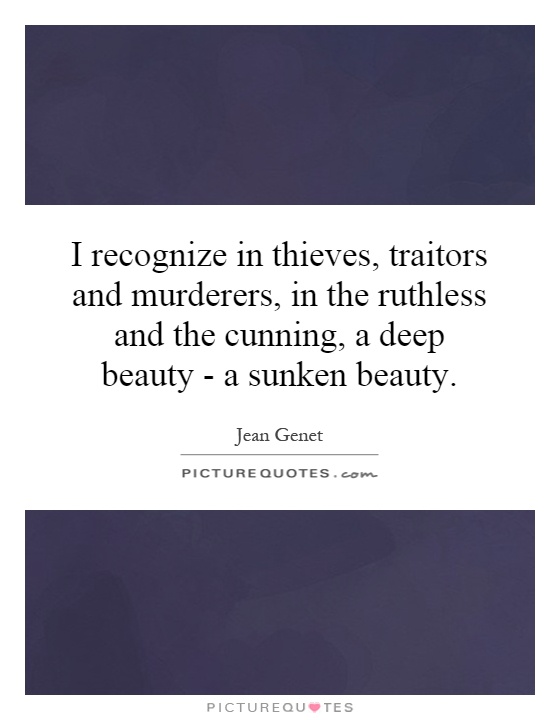I recognize in thieves, traitors and murderers, in the ruthless and the cunning, a deep beauty - a sunken beauty

I recognize in thieves, traitors and murderers, in the ruthless and the cunning, a deep beauty - a sunken beauty
Jean Genet, a French novelist, playwright, and poet, was known for his provocative and controversial works that often explored themes of criminality, sexuality, and social outcasts. His own life as a petty criminal and outsider greatly influenced his writing, leading him to have a unique perspective on the darker aspects of humanity. In his works, Genet often portrayed thieves, traitors, and murderers as complex and even alluring figures, finding a certain beauty in their ruthlessness and cunning.Genet's statement, "I recognize in thieves, traitors and murderers, in the ruthless and the cunning, a deep beauty - a sunken beauty," reflects his fascination with the marginalized and the criminal. He saw these individuals not as mere villains, but as complex and multifaceted characters who defied societal norms and expectations. In his writing, Genet delved into the psyche of these outcasts, exploring the motivations behind their actions and the inner turmoil that drove them to commit such heinous acts.
One of Genet's most famous works, "The Thief's Journal," is a semi-autobiographical account of his own experiences as a thief and a vagabond. In this novel, Genet blurs the lines between reality and fiction, creating a narrative that is both raw and poetic. Through the character of the thief, Genet explores themes of alienation, desire, and the search for identity. The thief is not portrayed as a mere criminal, but as a complex and enigmatic figure who embodies both the darkness and the beauty of the human soul.
Genet's fascination with thieves, traitors, and murderers can be seen as a reflection of his own outsider status. As a gay man and a criminal, Genet existed on the fringes of society, constantly challenging the norms and conventions of his time. Through his writing, he sought to give a voice to those who were marginalized and oppressed, finding beauty in their defiance and resilience.












 Friendship Quotes
Friendship Quotes Love Quotes
Love Quotes Life Quotes
Life Quotes Funny Quotes
Funny Quotes Motivational Quotes
Motivational Quotes Inspirational Quotes
Inspirational Quotes